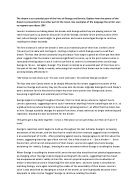George finally agrees with Lennie to retell the dream; reasoning with himself that Lennie would ‘get a kick outta that’ on each occasion that he retold the dream, hinting that to Lennie the dream is extremely important, up to the point that Lennie seems to be almost in desperation to hear the dream from George despite knowing it himself already. The fact that Lennie wishes to hear the dream being told by George suggests that the two characters both share the importance of the dream, despite the fact that George on the outside denies this. It becomes clear that on the inside George secretly enjoys envisioning the dream too, when his speech changes into a ‘deeper’ voice as he begins telling the dream to Lennie. The passage describes George as speaking ‘rhythmically’, a contrast to his previous snapping and sharp tone, suggesting that to George the dream is important enough to change his entire personality, reflected by his tone of voice. The text also describes George ‘as though he had said them many times before’, again hinting at the fact that the dream has previously been repeated and the fact that George repeats the dream systematically suggests that the dream itself has become a part of his life; this part of his life is also shared with Lennie who revels in hearing the dream being told to him.
George describes themselves as being the ‘loneliest guys in the world’, having ‘no family’ and who ‘don’t belong no place’, describing the harshness of their actual life. However Lennie interrupts George, begging him to tell him of the dream and ‘how it is with us’, showing that the dream is important as it allows the two ranch workers to be different from all the other ranch workers across the country:
“But not us! Because… because I got you to look after me, and you got me to look after you, and that’s why”
George continues by ‘[laughing] delightedly”, another contrast from his previous denial of the importance of the dream; the reader can clearly see that George does share the view with Lennie that the dream is important. The fact that George asks Lennie to continue telling the dream also suggests how part of the importance of the dream comes from the friendship between the two of them, and Lennie’s response of “No, you. I forgot some a’ the things” shows Lennie’s eagerness of sharing the dream with George and hoping for the future. Lennie continues this by suddenly interrupting George, shouting “An’ live off the fatta the lan’…an’ have rabbits. Go on, George!...Tell about that, George!”, and how ‘It ain’t the same’ if George is not telling the story of the dream indicates the importance of the dream to both Lennie and George, despite Lennie seemingly being more interested in the dream than George.
The importance of the dream to both characters is further emphasised in the closing paragraph of the passage when George explains how “when it rains in winter, we’ll just say the hell with goin’ to work”, showing how the dream is able to throw away the normal aspects of their life such as working and shows the stark contrast between their actual life and their dream. George finally decides that revelling in thoughts of their dream is ‘Nuts’, and suddenly quickly changes back into his old persona of denying enjoying thoughts of the dream, saying “I ain’t got time for no more”. Despite his denial the reader is able to see how George secretly still enjoys thinking about the dream, and the text shows that George only forces himself to stop thinking about the dream in order to have a more realistic view of life, allowing the two to possibly reach the dream in the future through their dedication to their current life; the dream still constantly underlies everything in their lives.








